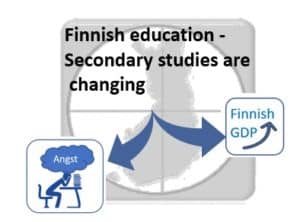
What will change?
In the autumn semester of 2021, new high school and vocational school students in Finland will have access to free learning materials. The reform progresses each year with a new, beginner grade level at a time, and in 2023, all high school students will have free books. Underlying this is new legislation that raises compulsory schooling from 16 to 18 years of age. In the other Nordic countries, compulsory education ends at the age of 16, which means that we are taking a leap to increase civilization. Hopefully this succeeds!
In the autumn of 2021, a new curriculum will also enter into force, with the aim of supporting students’ well-being, individual needs and learning, and facilitating the transition from secondary to higher education. In addition, the goal is to increase the attractiveness of high school as a general education and preparation for higher education, while enhancing the quality of education and learning.
Finland has something to gain from the reform, and we can – if the reform only succeeds – gain a competitive advantage over other Nordic countries, for example. In practice, the change seeks more applicability and breadth between subjects. In the future, students will have the opportunity to receive additional study guidance and special support. This is important, because in order to enter university with the grades of a student certificate, a high school student must think about his or her own field of study and the subjects leading to it. The studies are compiled into modules, from which the study courses are compiled. In addition, the goal is external cooperation with universities, working life and entrepreneurs, as well as internationalization.
Advanced math is growing in popularity
The goals seem really great, and increasing general education has not been left out either. The subjects have the so-called compulsory share (number of courses), in which case the perspective of general education is also taken into account. No one graduate from high school without studying Finnish history or biology. In practice, it is usually compulsory to complete a compulsory first course in each subject.
It is already known that the number of advanced math students and students taking matriculation exams has increased over the past year. The position of the mother tongue is strong, because writing and content production should be valued: many jobs require writing and text analysis skills.
Specialization begins earlier and earlier
In the future, high school students will not have time to waste. At the beginning of high school, it should be clear which subjects to invest in. The student will apply for university with the grades of the matriculation exam. A small country is emerging between subjects, as studies that require advanced math in themselves give the highest score when pursuing university. It feels funny when math is appreciated almost everywhere. It remains to be seen if there will be new emphases? The universities are responsible for the application criteria.
Common knowledge as a traditional value disappears
Extensive common knowledge is certainly declining. Are there any more general education lyceums when everyone is focusing on math. The competence in mathematics is justified, but also the wide-ranging competence in various subjects, ie general education as a traditional intellectual value, will certainly disappear or these values will be given new content.
How does study change in other respects after the pandemic?
During the pandemic, students are accustomed to distance learning, at least in Southern and Southwestern Finland. It has caused a lot of inconvenience. The competence of many students has not progressed as desired. As teachers are not familiar with the situation of how distance learning can also be used as an inclusive and individual way of teaching, the results are not commendable everywhere either. It is interesting to monitor whether there are differences between Southern and Southwestern Finland and the rest of the country in the same way as in previous years.
After the coronavirus pandemic, the good things of distance learning should be introduced and practical teaching that supports both attendance and distance learning should be created. This also provides opportunities for more individualized teaching and benefits a variety of learners. There is a lot of talk in the world in the Far East about distance learning. There, the population is large and the competition is fierce, so further and distance learning on one’s own time is considered normal. Finland and Europe still swear by school teaching that includes a lot of social interaction.
Reform can rush into an extended phase of youth, things are now done later in life
The fear of the reform is an increase in student stress. The competition starts already in high school. It is crucial how well a student succeeds in matriculation examination. Fortunately, there is an entrance test pathway and several faculties and subjects offer a 40 % or larger quota for applicants on the entrance test. The reform also allows for tactics. Students invest in specific subjects in their final exams and then systematically raise their grades after high school so that they can get to start the university studies they want. The start of higher education is moving against the goal of the reform. In itself, there is nothing miraculous about this, nowadays life is moving all the time forward, relationships are started and work goes on later and later. People have children at a later stage and they retire later, so they have time.
